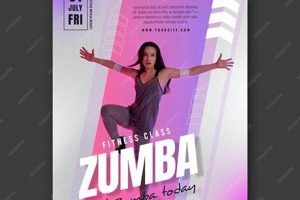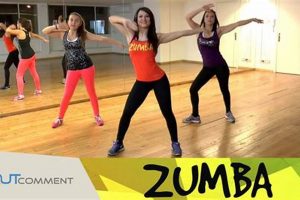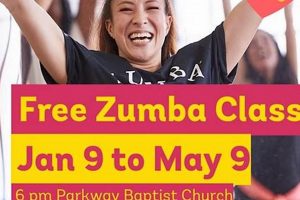The request identifies an individual’s desire to locate complimentary Zumba sessions in their immediate geographic area on the current day. This phrase represents a specific search query aimed at finding accessible fitness opportunities centered around the Zumba dance-fitness program.
The prevalence of searches targeting free Zumba sessions underscores the demand for accessible and cost-effective fitness options. Zumba’s appeal lies in its blend of exercise and entertainment, making it a popular choice for individuals seeking a fun and engaging way to improve their physical well-being. Historically, access to fitness programs has been limited by cost; therefore, the availability of free classes promotes greater inclusivity and participation.
The subsequent article will explore strategies for discovering these sessions, potential sources of information, and factors that may influence the availability of complimentary offerings. It will also touch upon considerations for evaluating the quality and suitability of these options.
Locating Complimentary Zumba Sessions
The following outlines practical guidance for individuals seeking no-cost Zumba opportunities in their vicinity for immediate participation.
Tip 1: Leverage Online Search Engines: Utilize search engines with precise location settings enabled. Refine searches using specific keywords related to free Zumba classes. Employ filters to prioritize results relevant to the current day.
Tip 2: Explore Community Centers and Local Gyms: Contact local community centers and fitness facilities directly. Inquire about promotional periods, trial sessions, or community outreach programs that may include complimentary Zumba classes.
Tip 3: Utilize Social Media Platforms: Monitor local social media groups and pages dedicated to fitness and community events. Organizations frequently announce free promotional classes via these channels.
Tip 4: Check Municipal and Governmental Websites: Examine websites of local municipalities and parks and recreation departments. These entities often sponsor free fitness programs for residents.
Tip 5: Consider Introductory Offers and Promotions: Actively seek out introductory offers from Zumba studios. Many businesses provide free initial classes to attract new clients.
Tip 6: Enquire at Senior Centers: Senior centers may host free or low-cost Zumba Gold classes, designed for older adults.
Tip 7: Review Fitness Apps and Websites: Some fitness applications and websites aggregate local fitness offerings, including potentially free Zumba sessions. Thoroughly examine the terms and conditions before registering for any trial periods.
These strategies represent practical pathways to discovering accessible Zumba classes. Persistence and proactive inquiry are crucial for identifying readily available opportunities.
The article will next address important factors to consider when evaluating the quality and safety of any free Zumba class found.
1. Location Specificity
Location specificity functions as a cornerstone of the query for “free Zumba classes near me today.” The inherent nature of the request necessitates a geographically constrained search; the individual seeks opportunities within a reasonable proximity to their present location. Without this element, the search results would be indiscriminate and largely irrelevant, yielding classes potentially hundreds or thousands of miles away. The effectiveness of finding a suitable Zumba session is directly proportional to the accuracy and precision of the location data utilized. For instance, a search originating from a particular zip code requires the search engine to prioritize results within that zip code and adjacent areas. The lack of accurate location identification renders the query essentially meaningless.
The reliance on location data extends beyond simply identifying nearby classes. It also influences the type and availability of offerings. In densely populated urban areas, the prevalence of fitness studios and community centers often translates to a higher likelihood of finding promotional or free Zumba sessions. Conversely, in rural or sparsely populated regions, the search may yield fewer results or necessitate a willingness to travel farther to participate. Furthermore, the economic demographics of a given location can affect the availability of free programs; areas with higher poverty rates may have more subsidized fitness initiatives. Accurate location data therefore serves as a gateway to identifying opportunities that align with the searcher’s geographic and socioeconomic context. Consider, for example, a search in a large metropolitan area; pinpointing the neighborhood or borough is critical, as different areas can offer drastically varying options.
In summary, location specificity is not merely a filter applied to the search for “free Zumba classes near me today” but an integral component defining its purpose and potential success. A robust understanding of this connection allows for more refined searches, leveraging location-based services and local resources to identify relevant and accessible fitness opportunities. The challenge lies in ensuring the accuracy of location data and understanding the local fitness landscape to optimize the search process, linking user to fitness.
2. Real-Time Availability
The temporal element inherent in “free zumba classes near me today” places significant emphasis on real-time availability. A search for a session on the current day necessitates information that reflects up-to-the-minute scheduling changes, cancellations, or unforeseen circumstances. Stale data, even if recent, renders the search results inaccurate and potentially misleading. A Zumba studio offering a free class listed online may have already reached maximum capacity, canceled the session due to instructor illness, or changed the time slot. Without real-time confirmation, the search proves unproductive. The individual arrives at the location only to discover the advertised opportunity is no longer valid.
The reliance on accurate, current scheduling highlights the importance of direct verification. Instead of solely relying on aggregated listings, contacting the venue directly provides assurance. A phone call or a check of the studio’s social media feed might reveal last-minute alterations to the schedule. Furthermore, some fitness platforms and scheduling software now offer live updates, reflecting immediate changes to class availability. For example, a platform displaying a “spaces available” indicator that dynamically adjusts based on actual bookings offers a more reliable indication of real-time status. The searcher should therefore seek out sources known for their commitment to maintaining current data, and independently confirm the information through direct communication with the provider.
In conclusion, real-time availability forms a critical, often overlooked, component of searching for fitness opportunities. Its absence transforms a promising search into a potentially futile endeavor. By recognizing the importance of current information and employing strategies to verify class schedules, individuals can maximize their chances of finding and participating in a “free Zumba class” that is indeed both available and accessible on the intended day. Ignoring this aspect can result in wasted time and frustration, while actively pursuing real-time data ensures a more efficient and successful search process.
3. Instructor Qualification
The pursuit of complimentary Zumba sessions should not supersede the critical evaluation of instructor qualifications. While the prospect of a free class is appealing, the quality of instruction directly impacts participant safety, efficacy of the workout, and overall experience.
- Zumba Certification Validity
Certified Zumba instructors possess credentials from Zumba Fitness, LLC. Verification of active certification status is paramount. Lapsed or invalid certifications indicate a potential deficiency in current knowledge of Zumba techniques and safety protocols. For instance, an instructor who completed their training several years prior without maintaining their certification may not be familiar with updated routines or safety guidelines. This facet bears a direct connection to injury prevention and the overall quality of the class experience.
- Experience Level and Teaching Style
Instructor experience influences the ability to cater to varying fitness levels and provide modifications for individuals with limitations. An experienced instructor can adeptly adapt routines to accommodate beginners while challenging more advanced participants. Conversely, a novice instructor may struggle to effectively manage a diverse class. Teaching style further impacts engagement and motivation. A skilled instructor possesses the ability to create a positive and inclusive environment, fostering participant adherence and enjoyment.
- CPR and First Aid Certification
CPR and First Aid certification constitutes a fundamental safety requirement. In the event of a medical emergency during a Zumba session, a certified instructor can administer immediate assistance until professional medical personnel arrive. The absence of such certification represents a significant liability, potentially jeopardizing participant well-being. This is particularly relevant in higher-intensity Zumba classes where the risk of physical exertion and related incidents is elevated.
- Insurance Coverage
Instructors, even those offering complimentary classes, should maintain adequate liability insurance coverage. This protects both the instructor and participants in the event of an injury or accident. The absence of insurance creates potential financial risks for both parties. Inquiry into insurance coverage is a prudent step in assessing instructor qualifications and mitigating potential liabilities associated with participation.
The emphasis on instructor qualification is not intended to discourage participation in “free Zumba classes near me today,” but rather to promote informed decision-making. By prioritizing safety and quality, individuals can maximize the benefits of these sessions while minimizing potential risks. A free class should not equate to a compromise on instructor competence and adherence to safety standards. The cost of a qualified and experienced instructor is an investment in well-being, regardless of whether the class itself is offered at no charge.
4. Class Suitability
Class suitability is a pivotal, yet often overlooked, factor when evaluating opportunities for complimentary Zumba sessions. The availability of a “free Zumba class” does not inherently guarantee its appropriateness for a given individual; aligning class intensity, skill level, and physical limitations with the class profile is paramount for both safety and efficacy.
- Fitness Level Compatibility
Zumba classes are structured across a spectrum of intensity levels, ranging from beginner-friendly “Zumba Gold” to high-energy routines suitable for experienced participants. Enrolling in a class that exceeds one’s current fitness capabilities can lead to injury, discouragement, and ultimately, abandonment of the exercise program. For instance, an individual with limited cardiovascular endurance attempting an advanced Zumba session risks overexertion and potential cardiovascular complications. Conversely, a seasoned participant may find a beginner class insufficiently challenging, diminishing its overall benefit. Therefore, assessing and matching personal fitness level with the advertised class description is crucial. Many studios offer introductory classes or level assessments to facilitate appropriate placement.
- Physical Limitation Considerations
Pre-existing medical conditions or physical limitations necessitate careful consideration prior to participation in any Zumba class, free or otherwise. Individuals with joint pain, back problems, or cardiovascular concerns should consult with a healthcare professional to determine the suitability of Zumba and identify any necessary modifications. A class that requires repetitive jumping or high-impact movements may be contraindicated for individuals with knee problems. Similarly, those with respiratory conditions may require modifications to accommodate breathing difficulties. Failure to account for physical limitations can exacerbate existing conditions and increase the risk of injury. Some studios offer specialized Zumba classes tailored to specific populations, such as chair Zumba for individuals with mobility challenges.
- Age Appropriateness
While Zumba transcends age barriers, class formats and intensity levels may be more suitable for certain age groups. Children’s Zumba classes, for example, are tailored to the developmental stages and attention spans of younger participants. Senior-specific Zumba classes (“Zumba Gold”) incorporate modified movements and reduced intensity to accommodate the physical limitations of older adults. Participating in a class designed for a significantly different age group can lead to both physical and social discomfort. An older adult participating in a high-energy class geared towards young adults may feel overwhelmed and unable to keep pace, while a child in an adult class may find the choreography too complex and the music inappropriate.
- Instructor Expertise and Modification Capabilities
The instructor’s ability to adapt the class to individual needs and limitations is a key determinant of class suitability. A skilled instructor can provide modifications for participants with injuries, physical limitations, or varying fitness levels, ensuring that everyone can participate safely and effectively. The instructor should be able to offer alternative movements, adjust the intensity of the workout, and provide clear instructions. Conversely, an instructor who lacks the experience or willingness to provide modifications may not be suitable for individuals with specific needs. Participants should feel comfortable communicating their limitations to the instructor and receiving appropriate guidance. Observing a class beforehand can provide insights into the instructor’s teaching style and ability to accommodate individual needs.
In summation, while the allure of a “free Zumba class near me today” is undeniable, prioritizing class suitability ensures a safe, effective, and enjoyable experience. Matching personal fitness level, physical limitations, age, and instructor expertise with the class profile is essential for maximizing benefits and minimizing risks. A thorough assessment of these factors transforms a potentially detrimental experience into a positive contribution to overall well-being, enhancing fitness.
5. Promotion Validity
The allure of “free Zumba classes near me today” is inherently contingent upon the legitimacy and currency of the promotional offer. Promotion validity represents a critical gatekeeper, determining whether the advertised class is genuinely accessible at no cost and on the specified date. Without verifiable promotion validity, the search devolves into a pursuit of potentially nonexistent or misleading opportunities, resulting in wasted time and frustration. A studio might advertise a “free introductory class,” but upon arrival, hidden enrollment fees or limited-time offers that have already expired may be revealed. The offer must align with the specific date of the search.
Effective evaluation of promotional validity involves several practical steps. Direct verification with the provider, whether through a phone call or a visit to their official website, is essential. Scrutinizing the fine print of the promotion, if available, can expose hidden conditions or limitations. For example, a seemingly free class might require the purchase of a membership or be restricted to residents of a particular community. Cross-referencing the promotional information with independent sources, such as local community calendars or review websites, can provide a broader perspective and identify any inconsistencies. Furthermore, inquiring about the terms and conditions of the offer can prevent unexpected charges or obligations. A common tactic involves requiring participants to provide credit card information for a “free trial,” only to automatically enroll them in a paid membership upon its expiration.
In conclusion, the connection between promotion validity and the successful acquisition of “free Zumba classes near me today” is inextricably linked. Diligent verification of promotional offers is not merely a precautionary measure but a fundamental step in ensuring a productive search and avoiding deceptive marketing practices. A proactive approach to validating offers enhances the likelihood of discovering genuinely accessible fitness opportunities and mitigating potential financial or logistical disappointments. A skeptical eye and a commitment to thorough investigation serve as effective defenses against misleading advertisements.
Frequently Asked Questions
The following addresses common inquiries regarding the availability, accessibility, and participation in free Zumba classes within a specified geographical area and timeframe.
Question 1: What constitutes a genuinely “free” Zumba class, and what potential hidden costs should be considered?
A genuinely free Zumba class requires no financial commitment from the participant, either upfront or subsequently. Potential hidden costs may include mandatory membership fees, equipment rentals, or promotional sign-up requirements that automatically convert into paid subscriptions. Scrutinizing the fine print and directly confirming the terms with the provider mitigates the risk of incurring unexpected expenses.
Question 2: How can the reliability of information regarding free Zumba classes be assessed, particularly when sourced from online platforms?
Reliability is enhanced by cross-referencing information from multiple sources, including official studio websites, community calendars, and independent review platforms. Direct verification with the provider through phone or email communication provides the most definitive confirmation of class availability and promotional terms. A critical assessment of the source’s reputation and the timeliness of the information is also recommended.
Question 3: What qualifications should an instructor possess to ensure a safe and effective Zumba experience, even in a free class setting?
A certified Zumba instructor holds a valid license from Zumba Fitness, LLC, demonstrating proficiency in Zumba techniques and safety protocols. CPR and First Aid certifications are essential for addressing potential medical emergencies. Experience level, teaching style, and insurance coverage further contribute to a safe and effective learning environment. Inquiring about the instructor’s credentials and observing a class beforehand allows for informed decision-making.
Question 4: How can an individual determine if a specific Zumba class is suitable for their fitness level and physical limitations?
Compatibility is determined by assessing the class’s intensity level, advertised skill requirements, and the participant’s pre-existing medical conditions. Consulting with a healthcare professional prior to participation is advisable for individuals with physical limitations. Instructors should be capable of providing modifications to accommodate varying fitness levels and limitations. Observing a class or communicating directly with the instructor allows for a personalized assessment of suitability.
Question 5: What steps can be taken to verify the real-time availability of a free Zumba class, particularly on the day of intended participation?
Real-time verification necessitates direct communication with the provider, either through phone or online channels. Checking the studio’s website or social media feeds for last-minute schedule changes or cancellations is also recommended. Relying solely on aggregated listings or outdated information can lead to inaccurate expectations. Confirmation of availability on the intended day minimizes the risk of wasted time and effort.
Question 6: What recourse is available if a free Zumba class deviates significantly from its advertised description or promotional terms?
Documenting the discrepancies and communicating directly with the provider is the initial step in addressing any issues. If a satisfactory resolution is not achieved, filing a complaint with consumer protection agencies or online review platforms may be warranted. Retaining copies of promotional materials and communication records is crucial for substantiating any claims of misrepresentation.
This FAQ section provides a foundational understanding of key considerations when seeking complimentary Zumba opportunities. A proactive and informed approach enhances the likelihood of a positive and beneficial experience.
The subsequent section will delve into the ethical considerations surrounding free fitness offerings and the importance of supporting sustainable fitness initiatives.
Conclusion
The preceding exploration of “free zumba classes near me today” illuminates the complexities involved in seeking accessible fitness opportunities. Locating such sessions necessitates diligent verification of promotional terms, scrutiny of instructor qualifications, and careful assessment of class suitability. The pursuit of cost-effective fitness must not supersede considerations of safety, efficacy, and ethical sourcing.
The long-term sustainability of community fitness initiatives hinges on informed participation and responsible patronage. Individuals should support programs that provide equitable access to fitness while ensuring fair compensation and ethical practices for instructors. The availability of complimentary sessions represents a valuable resource, but the preservation of this resource requires a commitment to informed and responsible engagement within the fitness ecosystem.




![Find FREE Zumba Classes Near Me for Ladies - [Location]! The Ultimate Zumba Guide: Dance Your Way to a Healthier You Find FREE Zumba Classes Near Me for Ladies - [Location]! | The Ultimate Zumba Guide: Dance Your Way to a Healthier You](https://mamazumba.com/wp-content/uploads/2025/10/th-896-300x200.jpg)


